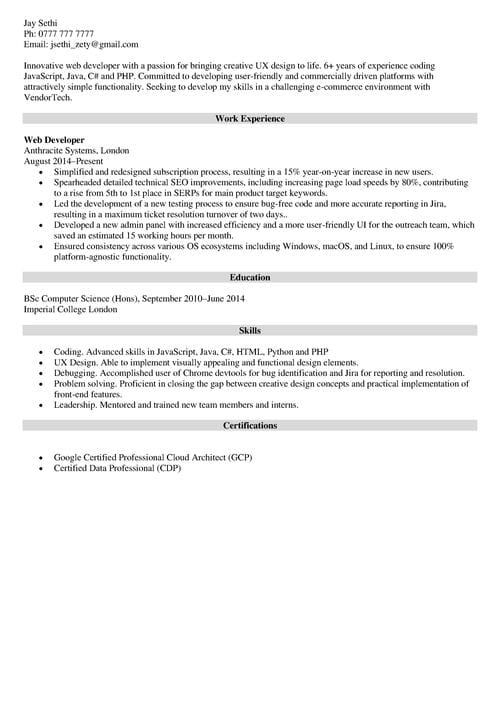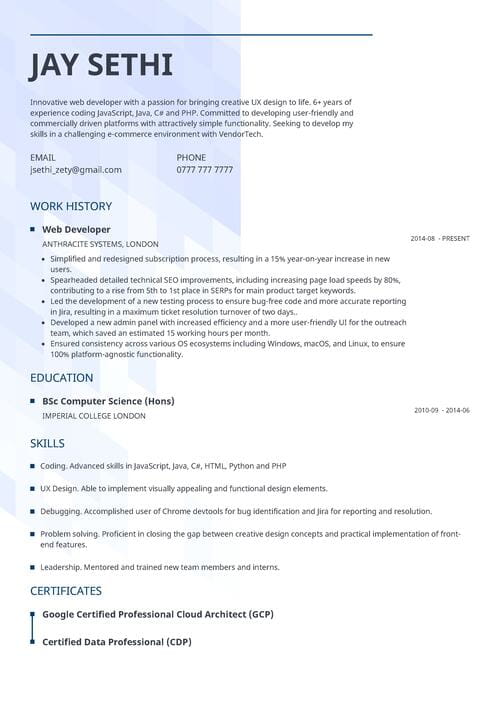Top 13 In-Demand IT Skills for Your CV in 2025
Create your CV nowIT skills are increasingly the most in-demand abilities in the workplace. And it’s not just a niche skill set for hardcore programmers and tech wizards anymore.
Basic IT skills are a must-have addition to your CV in a wide range of careers, and improving them is an easy way to boost your employability.
In this guide, you’ll learn:
- What basic & advanced IT skills are.
- Which IT skills for a CV are most sought after.
- IT skills examples to inspire your own CV.
- How to improve your IT skills to be more competitive.
Want to save time and have your CV ready in 5 minutes? Try our CV builder. It’s fast and easy to use. Plus, you’ll get ready-made content to add with one click. See 20+ CV templates and create your CV here.
Sample CV made with our builder—See more templates and create your CV here.
Now, sit back and see what it takes to become part of the IT crowd:
IT skills for a CV: example
Jay Sethi
Ph: 0777 777 7777
Email: jsethi_zety@gmail.com
Innovative web developer with a passion for bringing creative UX design to life. 6+ years of experience coding JavaScript, Java, C# and PHP. Committed to developing user-friendly and commercially driven platforms with attractively simple functionality. Seeking to develop my skills in a challenging e-commerce environment with VendorTech.
Work Experience
Web Developer
Anthracite Systems, London
August 2014–Present
- Simplified and redesigned subscription process, resulting in a 15% year-on-year increase in new users.
- Spearheaded detailed technical SEO improvements, including increasing page load speeds by 80%, contributing to a rise from 5th to 1st place in SERPs for main product target keywords.
- Led the development of a new testing process to ensure bug-free code and more accurate reporting in Jira, resulting in a maximum ticket resolution turnover of two days..
- Developed a new admin panel with increased efficiency and a more user-friendly UI for the outreach team, which saved an estimated 15 working hours per month.
- Ensured consistency across various OS ecosystems including Windows, macOS, and Linux, to ensure 100% platform-agnostic functionality.
Education
BSc Computer Science (Hons), September 2010–June 2014
Imperial College London
Skills
- Coding. Advanced skills in JavaScript, Java, C#, HTML, Python and PHP
- UX Design. Able to implement visually appealing and functional design elements.
- Debugging. Accomplished user of Chrome devtools for bug identification and Jira for reporting and resolution.
- Problem solving. Proficient in closing the gap between creative design concepts and practical implementation of front-end features.
- Leadership. Mentored and trained new team members and interns.
Certifications
- Google Certified Professional Cloud Architect (GCP)
- Certified Data Professional (CDP)
What are IT skills?
IT skills are the abilities needed to use information technology-based devices such as computers and tablets, along with operating systems and software. They encompass both hard skills (e.g. programming) and soft skills (e.g. teamwork), which are inevitable to succeed in IT-related professions.
Why are IT skills important for your CV?
The government report about digital skills in the UK proves that IT skills are an essential entry requirement for two-thirds of UK professions. These occupations make up 82% of online job vacancies. Possessing specific digital skills can reduce your chances of losing your job to automation by 59%.
Undoubtedly, you need IT skills now and in the future to maximise your potential employment prospects. The most important IT skills will change as technology advances, but next, we’ll look at the skills currently in demand.
Top 13 IT skills examples for your CV
If you’re looking for the most sought-after IT skills for a CV that can guarantee career success, then these are the areas you need to consider:
1. Mobile development
There’s every chance that you’re reading this on a mobile device. Mobile development skills are in ever-increasing demand. In 2020, just over half of the internet traffic came from mobile devices compared to just 3% 10 years ago. And 83% of social media visits are from mobile devices. Then there’s gaming, app development, and mobile website optimisation.
Perhaps most valuable of all is mobile e-commerce, or m-commerce, which was predicted to reach a value of 115 billion U.S. dollars in the UK by 2022. Mobile development is worth big money and offers all sorts of career opportunities, so it’s worth considering for your IT skills list.
2. Artificial Intelligence
Artificial intelligence, or AI, has been a tech buzzword for some years now, and for a good reason. It has the potential to transform all manner of industries. According to a report from PWC, the impact of AI is expected to contribute 5% of the UK's GDP by 2030. And as AI’s importance for the economy grows, so will the number of jobs involving its use and development. The machines are rising, and you need to be ready.
3. Cybersecurity
As businesses and organisations become ever more reliant on computers and computerised data, so too does the need to secure that information and infrastructure. Cybersecurity is a must-have for all workplaces, and two-thirds of businesses have reported a skills gap in technical cybersecurity skills. This, too, will remain one of the most lucrative sets of IT skills to develop for career success.
4. Data science
The value of data in the 27 EU member states and the UK in 2020 was estimated to exceed 440 billion euros. But that data would be worthless without skilled professionals to gather and interpret it. Data science is a highly desired IT skill that combines programming skills, machine learning, data wrangling, and more. And an understanding of data science isn’t just for specialists; it’s a valuable addition to any professional toolkit in the 21st century.
5. Blockchain
You’re most likely to know about blockchain via the cryptocurrency, Bitcoin, but there’s much more to it than ‘digital gold.’ Blockchain is another potentially transformative technology with applications in the fields of online payments, file storage, identity management, secure voting, smart contracts, and more. Combine that demand with a median annual salary of £75,000, and you have the recipe for a very valuable set of IT skills.
6. Cloud computing & Amazon Web Services
This is a two-in-one IT skill that’s well worth pursuing. Cloud computing is quite simply the delivery of computing services over the internet. It all takes place remotely and is then seamlessly delivered to you without any direct management by you or the machine you’re using. And the top name in cloud services is Amazon Web Services (AWS), they’re almost synonymous. In 2020, it generated almost 200 billion U.S. dollars annually. AWS and cloud skills are massively in demand, so they are a worthy addition to your IT skill set.
7. Internet of Things (IoT)
Another field with a real shortage of qualified candidates is IoT. The term describes the network of physical devices that are embedded with technologies that connect and exchange data with other objects and systems over the internet. By 2027, 41 billion IoT devices will be in use, consisting of a market worth $2.4 trillion U.S. dollars, The Business Insider's report says. Yes, you read that right, trillion. Getting your foot in the door by developing IT skills for this sector would be a very smart move indeed.
8. IT support
Did you switch it off and then on again? All jokes aside, IT support skills continue to be highly valued. No matter how advanced IT gets, it still goes wrong, and businesses need their issues dealt with promptly. Qualifications in Linux and Cisco are considered especially useful in IT support, but so are language skills. IT support often works across borders, so foreign language skills will give you an added advantage.
9. Virtual & Extended Reality
Virtual reality (VR) is emerging from being a mere novelty to a genuinely useful technology. Sectors as diverse as marketing, healthcare, and manufacturing are all set to benefit from virtual and augmented reality. And the demand for IT skills in VR reflects that potential. The demand for VR engineers is growing, hitting a massive 1,400%. If that doesn’t give you IT skill FOMO, then nothing will.
10. Programming
No list of in-demand IT skills would be complete without good old coding. It’s still an area with strong demand for qualified candidates. Many of the skills I’ve just mentioned are underpinned by a requirement to know how to code. And to round off our top 10 most important IT skills, here’s a bonus top 10 of programming languages, as compiled by Northeastern University.
10 Most popular programming languages
- Python
- JavaScript
- Java
- C#
- C
- C++
- Go
- R
- Swift
- PHP
11. Leadership
While technical expertise is essential in the IT industry, it’s hard not to mention soft skills that increase an IT professional’s effectiveness and job performance. Let’s take leadership skills. They often mean you’re not afraid to take initiative and guide and inspire others. Those with strong leadership skills communicate effectively, listen actively, and enjoy working with others.
If you aspire to hold a leadership position later in the future, it is great if you develop your leadership skills with consideration to your career development plans.
12. Communication
Communication is one of the key soft skills that every IT specialist should possess. It is a fundamental aspect of every IT task that helps professionals work smoothly on complex projects. Effective communication between team members ensures that everyone is well-informed about the project goals, progress of tasks, timelines, possible obstacles, and challenges. Besides technical jargon and clear communication with close team members, IT pros must use their communication skills to effectively convey complex technical information to those unfamiliar with IT terminology.
13. Time management
IT jobs require strong time management skills for one main reason. IT specialists often handle multiple projects simultaneously, and they’re pressured for time to meet tight deadlines. Strong time management skills help them stay on track, remain effective, and achieve key goals in the long run. Effective time management means that you can identify and prioritize tasks based on their importance and that you can address the most critical issues quickly.
Pro tip: To enhance your time management skills in IT roles, consider utilizing time-tracking tools and techniques. These can help you analyse how you spend your time, identify areas for improvement, and allocate your resources more efficiently.
How to include IT skills on your CV
Here’s how to wow recruiters with a section-by-section guide to optimising your CV IT skills:
1. Start with your CV summary
Also known as your CV profile, your CV summary is the introduction to your CV. Take advantage of the power of first impressions and include essential IT skills and credentials from the very start of your CV. Here’s an example of a CV summary that incorporates some top IT skills:
IT skills examples: CV summary
Innovative web developer with a passion for bringing creative UX design to life. 6+ years of experience coding JavaScript, Java, C# and PHP. Committed to developing user-friendly and commercially driven platforms with attractively simple functionality. Seeking to develop my skills in a challenging e-commerce environment with VendorTech.
2. Weave IT skills into your work experience section
If your CV was a computer, then your work experience section is the CPU. Everything else depends on it, and your CV just won’t work without it. Show how you use your CV IT skills to achieve results at work. Don’t just list what you did, explain how well you did it with numbered achievements and accomplishment statements:
IT skills examples for a CV: Work experience
Web Developer
Anthracite Systems, London
August 2014–Present
- Simplified and redesigned subscription process, resulting in a 15% year-on-year increase in new users.
- Spearheaded detailed technical SEO improvements, including increasing page load speeds by 80%, contributing to a rise from 5th to 1st place in SERPs for main product target keywords.
- Led the development of a new testing process to ensure bug-free code and more accurate reporting in Jira, resulting in a maximum ticket resolution turnover of two days.
- Developed a new admin panel with increased efficiency and a more user-friendly UI for the outreach team, which saved an estimated 15 working hours per month.
- Ensured consistency across various OS ecosystems including Windows, macOS, and Linux to ensure 100% platform-agnostic functionality.
3. Don’t forget your education section
Your CV education section is the perfect place to include proof of your IT skills if you lack experience. If you’re writing a student CV or a graduate CV, then add a bullet point or two to your education section, mentioning specific modules you studied or projects you completed.
IT skills examples for a CV: Education
BSc Computer Science (Hons), September 2010–June 2014
Imperial College London
- Key modules: Object Oriented Programming, Full Stack Application Development, Data Structures and Algorithms.
4. Optimise your skills section
Upgrade your skills section by coding a fresh iteration for every new job application. A targeted CV is much more effective than a generic copy-paste job. The easiest way to do it is to use the job advert as your source code. Read over it and note every IT skill mentioned in the job requirements. Then, be sure to mention your own IT skills that match. Add a brief statement to each that explains your proficiency for added impact.
IT skills examples for a CV: Skills section
- Coding. Advanced skills in JavaScript, Java, C#, HTML, Python and PHP
- UX Design. Able to implement visually appealing and functional design elements.
- Debugging. Accomplished user of Chrome devtools for bug identification and Jira for reporting and resolution.
- Problem solving. Proficient in closing the gap between creative design concepts and practical implementation of front-end features.
- Leadership. Mentored and trained new team members and interns.
5. Make use of additional sections
Don’t stop with your skills section. Adding extra sections to your CV is a sure-fire way to make you stand out as a candidate and add even more proof of your IT skills. Add a certifications section for professional qualifications and knowledge. Use a hobbies and interests section to highlight IT skills gained in your spare time. As long as it’s relevant, it’s worth including.
IT skills examples for a CV: Added sections
Certifications
- Google Certified Professional Cloud Architect (GCP)
- Certified Data Professional (CDP)
Making a CV with our builder is incredibly simple. Follow our step-by-step guide, use ready-made content tailored to your job and have a CV ready in minutes.
When you’re done, Zety’s CV builder will score your CV and tell you exactly how to make it better.
How to improve your IT skills
Don’t have any of the skills listed? Don’t worry; there’s never a bad time to brush up. Here’s how to improve your IT skills for a CV:
1. Identify your learning needs
It’s important to be targeted in your learning and focus on IT skills that will be useful for your chosen career path. Identify the most essential skills in your current sector or the one you aim to move into. Check what’s listed on job adverts, look at other people’s LinkedIn profiles, and talk to colleagues to identify which skills you should focus on. It doesn’t hurt to give it a Google, either. Typing in ‘IT skills for [fill job name]’ is a sure-fire way of getting lots of useful information.
2. Brush up on the basics
Verify if you’re fully conversant with basic IT skills before pursuing a specialisation. Ensure you have good computer skills and can work confidently with operating systems, basic productivity suites, and browsers. It’s a good idea to be comfortable using both Windows and macOS, as you may use both depending on your employer.
3. Learn from the experts
Thankfully, there’s a wealth of great information available online for free. Make it a habit to regularly read up on your chosen field of IT skill interest by checking high-quality tech media. Wired, Engadget, Gizmodo, TechCrunch, and the Financial Times technology section are some of the best outlets. Check out online tutorials on YouTube and blogs, too. They’re another excellent source of knowledge.
4. Make use of IT in everyday life
Make your quest to improve your IT skills fun by incorporating your practice into your everyday life. Turn your smartphone into a learning tool instead of a mere doom-scrolling black mirror. Start using productivity and tracking apps, and learn all the shortcuts and features of your device and your favourite social media sites. By doing so, you’ll better understand how devices work, how to work efficiently, and what UI design features are effective or not.
5. Take a course
There are many IT skills courses available online to improve your basic IT skills. Once you’ve identified which area you need to improve, look at the offerings available online. High-quality providers include The Open University, Udemy, Coursera, and EdX. And best of all, many of the courses are free.
6. Practise until you’re perfect
Nothing embeds learning more efficiently than putting your knowledge to practical use. Look for opportunities at work or in your personal life to use your newfound skills. Speak to your manager to see the opportunities to apply your IT skills. Consider gigs on sites like Fiverr. Do what it takes to ensure you can put your abilities to good use.
And when you’re finished, take a look at our guides to write a CV tailor-made to your career:
- Computer Science CV Example
- Photographer CV Example
- Video Editor CV Example
- Interior Design CV Example
- Finance CV Example
- Executive Assistant CV Example
- Retail Manager CV Example
- Nursing CV Example
- Personal Trainer CV Example
- Makeup Artist CV Example
Plus, a great cover letter that matches your resume will give you an advantage over other candidates. You can write it in our cover letter builder here. Here's what it may look like:
Plus, a great cover letter that matches your CV will give you an advantage over other candidates. You can write it in our cover letter builder here. Here's what it may look like:

See more cover letter templates and start writing.
Key Takeaway
IT skills are without a shadow of a doubt one of the most valuable sets of abilities you can develop for career success. Demand for them is constantly growing and there remains an IT skills shortage in key areas. Take advantage of the learning opportunities available and target the IT skills that are most in demand. And then for the perfect CV, include evidence of your IT skills throughout.
Thanks for reading. If you’d like to know more about general IT skills and how to include them in your CV then just ask in the comments section and we’ll be happy to help.
About Zety’s Editorial Process
Our editorial team has thoroughly reviewed this article to ensure it follows Zety’s editorial guidelines. Our dedication lies in sharing our expertise and providing you with actionable career advice that offers you real value. Every year, the quality of our content attracts 40 million readers to our site. But that’s not all – we conduct original research to gain a detailed understanding of the labour market. We take pride in being cited by top universities and leading media outlets in the UK and worldwide.
Sources
- https://assets.publishing.service.gov.uk/government/uploads/system/uploads/attachment_data/file/807830/No_Longer_Optional_Employer_Demand_for_Digital_Skills.pdf
- https://www.statista.com/statistics/277125/share-of-website-traffic-coming-from-mobile-devices/
- https://www.statista.com/statistics/477368/us-social-media-visits-share/
- https://www.statista.com/topics/5888/mobile-commerce-in-the-uk/
- https://www.gov.uk/government/publications/cyber-security-skills-in-the-uk-labour-market-2020/cyber-security-skills-in-the-uk-labour-market-2020
- https://www.statista.com/statistics/1134993/value-of-data-economy-eu-uk/#:~:text=Value%20of%20data%20economy%20in%20EU%20and%20UK%202016%2D2020%20and%202025&text=According%20to%20statistics%20published%20by,440%20billion%20euros%20in%202020.
- https://www.statista.com/topics/4418/amazon-web-services/#:~:text=In%20terms%20of%20market%20size,dollars%20(IaaS)%20by%202022.
- https://www.northeastern.edu/graduate/blog/most-popular-programming-languages/






![CV Introduction [+Opening Paragraph Examples]](https://cdn-images.zety.com/pages/cv_introduction_zety_uk_3.jpg?fit=crop&h=250&dpr=2)